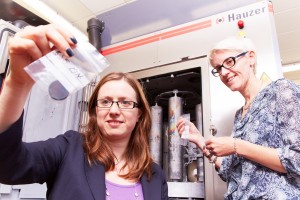Yorkshire Lib Dem MEP, Rebecca Taylor, has welcomed the European Parliament agreement on the EU funding programme for science and research. This comes as Rebecca visited a project in Leeds that has benefited from EU research funds.
The Lifelong joints programme, coordinated by Professors Richard Hall and Anne Neville in the University of Leeds’ School of Mechanical Engineering, is a prestigious €18.3 million budget project receiving €13.3 million contribution in EU funding via the Framework 7 programme to help in the development of more effective artificial joint replacements.
Joint replacements represent a medical market exceeding £10 billion a year that is expected to rise with an increasingly ageing population. Rebecca got to see for herself how the process works and how the EU funding has helped both the research and the region.
Commenting after the visit, Rebecca said,
“It was great to be able to see for myself how EU funding is making a real difference on the ground. This is vital research bringing real benefits, both for the individuals who get better quality joint replacements, but also for the region, which gets vital investment in high skill jobs”
Rebecca met Professor Anne Neville and the team from the LifeLongJoints project at the University of Leeds. Professor Neville, Professor of Tribology & Surface Engineering in the University’s School of Mechanical Engineering, said,
“The objective of the project is to develop new coatings for joint replacements that will dramatically improve their longevity and reliability. We are looking at all of the stages where these implants currently fail and identifying ways of alleviating the effects of wear debris that can cause biological reactions in patients. The LifeLongJoints project is aiming to improve the quality of life for patients by avoiding implant failures and the need for revision operations. We would not be able to put together such an ambitious project without the support of European funding”
Welcoming the latest proposed investment Rebecca added,
“We should be proud of the fact that British universities and research centres take part in more EU-funded research projects than any other country in Europe. As a result of our EU membership, the UK will now see a £60 billion package that will ensure the UK remains at the vanguard of developing the pioneering technologies of the future. This will see breakthroughs in areas as diverse as discovering cures to deadly diseases and developing new forms of low-cost, sustainable transport and energy.”
Under the new programme, €24.3 billion has been allocated to research, €17 billion for industrial innovation and €31 billion to help address major challenges such as making renewable energy more affordable, developing sustainable transport and mobility and coping with the challenge of an ageing population. Lib Dems were successful in ensuring future EU research and innovation funding will be far more easily available to Small to Medium size Enterprises.
ENDS
Photo of Rebecca Taylor MEP and Professor Anne Neville
Further information:
For the University of Leeds, contact: Chris Bunting, Senior Press Officer, University of Leeds; phone +44 113 343 2049 or email c.j.bunting@leeds.ac.uk
Notes for editors:
1. The EU’s Horizon 2020 programme was approved in a vote in the European Parliament’s Industry, Research and Energy committee. The final vote is expected at the European Parliament’s plenary session in Strasbourg on the 21st – 24th October.
Under the new programme, the budget is split into three areas: £20 billion has been allocated to research, £14 billion for industrial innovation and £26 billion to help address major challenges such as making renewable energy more affordable, developing sustainable transport and mobility and coping with the challenge of an ageing population.
2. “LifeLongJoints” began on 1 April 2013 and runs until 31 March 2018. Of the total project costs of €18,286,366, project funding of €13,317,000 is contributed by the EU’s Framework 7 Cooperation programme Nanosciences, nanotechnologies, materials and new production technologies (NMP), Grant Agreement No. NMP-310477.
The LifeLongJoints project partners are: University of Leeds, UK (Coordinator); TuTech Innovation GmbH, Germany; Aesculap AG, Germany; Anybody Technology A/S, Denmark; Hamburg University of Technology (TUHH), Germany; Ionbond AG, Switzerland; Linköping University, Sweden; Peter Brehm GmbH, Germany; Simulation Solutions Limited, UK; Swiss Federal Institute of Technology Zurich; The Leeds Teaching Hospitals National Health Service Trust, UK; Uppsala University, Sweden; University of Zurich, Switzerland; Wilhelm Schulthess Foundation, Switzerland;
3. The Faculty of Engineering at the University of Leeds is ranked 7th in the UK for the quality of its research (2008 Research Assessment Exercise); an impressive 75% of the Faculty’s research activity rated as internationally excellent or world leading. It includes the Schools of Computing, Mechanical Engineering, Civil Engineering, Electronic and Electrical Engineering, and Process, Environmental and Materials Engineering. www.engineering.leeds.ac.uk.
4. The project is being coordinated by the School of Mechanical Engineering, which is internationally recognised for high quality fundamental and applied research covering many aspects of Mechanical Engineering Science and Practice. The School achieved an impressive 75% of staff rated internationally excellent or World leading in the UK Government Research Assessment Exercise (RAE), placing the School in the top 5 in the UK. All academic staff within the School are active in research, and the School’s annual research spend is over £2 million. Its research activities are funded by grants from the European Union, UK Research Councils (such as the Engineering & Physical Sciences Research Council), government departments, and many industrial sources.
5. The 2008 Research Assessment Exercise showed the University of Leeds to be the UK’s eighth biggest research powerhouse. The University is one of the largest higher education institutions in the UK and a member of the Russell Group of research-intensive universities. The University’s vision is to secure a place among the world’s top 50 by 2015. www.leeds.ac.uk
